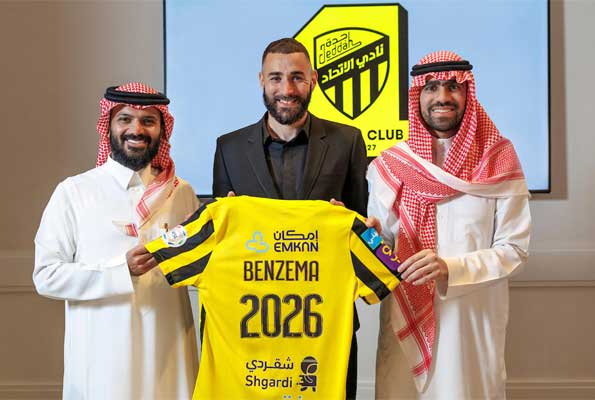The emphasis on attracting more elite football players into the Saudi Arabian league is at an all-time high, with French soccer star Karim Benzema being the most recent to do so.
According to rumours from veteran Italian journalist and transfer guru Fabrizio Romano, the Kingdom is interested in bringing seven more footballers to its top-flight league.
This summer, they want players like Sergio Ramos, Sergio Busquets, Jordi Alba, Iago Aspas, N’Golo Kante, and Pierre-Emerick Aubameyang. These players supposedly receive record sums of money, significantly more than what other elite teams would provide.
But why has this Middle Eastern nation’s interest in footballers suddenly increased?
Let’s look more closely.
The 2030 FIFA World Cup Host City
When Saudi Arabia’s national football team defeated eventual 2022 World Cup champions Argentina in their opening group-stage match, it was one of the biggest upsets in the history of the sport’s showpiece event.
Even though that victory will live in the memory of the Kingdom’s citizens, they have also been progressively expanding their football landscape in other ways.
Another piece of positive news for Saudi’s long-term football prospects is the purchase of Premier League team Newcastle United and its qualification for the UEFA Champions League in just its second season under the Kingdom-backed owners.
The club’s ownership has come under fire for allegedly engaging in another instance of sports washing. Yet, their conduct in the transfer market and in developing the club’s infrastructure has been excellent.
They have plenty of money right now, but instead of splashing it on famous players; they have endeavored to develop things uniformly.
All of this will only boost their local league’s popularity and chances of hosting the FIFA World Cup 2030, along with their desire to attract top players.
Not Only In Football But Also In Other Sports
Although Saudi Arabia might be exclusively concerned with football, they have expanded their emphasis on supporting other sports in their nation.
One excellent illustration of that is the Saudi Arabian Grand Prix.
The ten-year association with WWE is particularly noteworthy, with the firm earning several times as much per event as they would at their main event, WrestleMania.
However, sport is essential to Saudi Arabia’s leadership’s ‘Vision 2030’ national development agenda and a tool in international affairs for building goodwill, fostering diplomatic ties, and attracting investments.
Ibrahim Alkassim, general secretary of the Saudi Arabian Football Federation (SAFF), is a man on a mission. The Saudi FA knows that football has a significant role as the kingdom advances toward realizing its national ‘Vision 2030’.
According to Alkassim, ‘Vision 2030’ aspires to diversify its economy and decrease its reliance on oil, which will benefit significantly from the sport’s emergence as a soft power.
“Vision 2030 is a tactical plan that will put Saudi Arabia in front of the world’s top nations. Although the Saudi Arabian economy primarily depends on oil, diversifying the economy is a part of the 2030 transformation. The quality of life is the first of three significant elements that make up Vision 2030. Sport is a component of the quality of life,” he remarked.
He believed that sports might, directly and indirectly, affect a nation’s economy more significantly. He notably discussed how a country with a strong sporting culture tends to spend less in other areas, which helps the economy.
“Sports were just sports when we chose the tagline Vision 2030. But in today’s economy, sports play a larger role. Sports not only directly impact the economy but also indirectly impact other fields when you consider the entire ecosystem in any culture or nation,” the official stated further.
Mohammed bin Salman, the crown prince of Saudi Arabia, has realized that sports make for an excellent platform for imagining and cultivating favorable political sentiment. You can avoid the typical political spotlight through sports, and bin Salman also uses sporting events to forge new diplomatic ties, and new trade agreements, draw tourists, and generally use sport as a focal point for the place in the global community that the regime seeks to carve out for itself.
The concern is how the sports world will react to a regime that interacts and invests heavily in sports while having a human rights record like Saudi Arabia’s. The sports industry has laid out the red carpet for now.
Image Credits: Al-Ittihad



